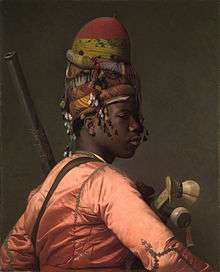Bashi-bazouk

A bashi-bazouk or bashibazouk (Turkish başıbozuk, literally "damaged head", also named delibaş, literally "crazy head", both meaning "free headed", "leaderless", "disorderly") was an irregular soldier of the Ottoman army. A Bashi-Bazouk may be Turk but also Circassian, Arab, Albanian, Bosniak.[1] They were particularly noted for their lack of discipline.
Irregulars

Although Turkish armies always contained bashi-bazouk adventurers as well as regular soldiers, the strain on the Ottoman feudal system caused mainly by the Empire's wide expanse required heavier reliance on irregular soldiers. They were armed and maintained by the government, but did not receive pay and did not wear uniforms or distinctive badges. They were motivated to fight mostly by expectations of plunder.[5] Though the majority of troops fought on foot, some troops (called akinci) rode on horseback. Because of their lack of discipline, they were incapable of undertaking major military operations, but were useful for other tasks such as reconnaissance and outpost duty. However, their uncertain temper occasionally made it necessary for the Turkish regular troops to disarm them by force.[4]
The Ottoman army consisted of the following:
- The Sultan's household troops, called Kapıkulu, which were salaried, most notable being Janissary corps.
- Provincial soldiers, which were fiefed (Turkish Tımarlı), the most important being Timarli Sipahi (lit. "fiefed cavalry") and their retainers (called cebelu lit. armed, man-at-arms), but other kinds were also present.
- Soldiers of subject, protectorate, or allied states (the most important being the Crimean Khans)
- Bashi-bazouk usually did not receive regular salaries and lived off loot.

History

An attempt by Husrev Pasha to disband his Albanian bashi-bazouks in favor of his regular forces began the rioting which led to the establishment of Muhammad Ali's Khedivate of Egypt.[6]
Reputation
The bashi-bazouk were notorious for being brutal and undisciplined,[7] thus giving the term its second, colloquial meaning of "undisciplined bandit" in many languages. A notable example of this use is in the comic series The Adventures of Tintin, where the word is often used as an expletive by Captain Haddock.[8][9]
Their use was abandoned by the end of the 19th century. However, self-organized bashi-bazouk troops still appeared later.
The term "bashibozouk" has also been used for a mounted force, existing in peacetime in various provinces of the Ottoman Empire, which performed the duties of gendarmerie.
See also
Notes
- ↑ Star , Issue 6345, 26 November 1898, Page 7
- ↑ Repin, Volume 1; Igor Emanuilovich Grabar'; 1948; p.391 (in Russian)
- ↑ Bulgaria today: Volume 15, Issue 4; 1966; p.35
- 1 2
 Chisholm, Hugh, ed. (1911). "Bashi-Bazouk". Encyclopædia Britannica (11th ed.). Cambridge University Press.
Chisholm, Hugh, ed. (1911). "Bashi-Bazouk". Encyclopædia Britannica (11th ed.). Cambridge University Press. - ↑ Montgomery 1968, p. 246
- ↑ Inalcık, Halil. Trans. by Gibb, H.A.R. The Encyclopaedia of Islam, New Ed., Vol. V, Fascicules 79-80, pp. 35 f. "Khosrew Pasha". E.J. Brill (Leiden), 1979. Accessed 13 Sept 2011.
- ↑ ”[T]he faintest stirrings would unloose a whirling of janissaries and spahis and later on, and perhaps the worst, bashi-bazouks. They adorned the towns with avenues of gibbets, the burnt villages with pyramids of heads and the roadsides with impaled corpses." Fermor, Patrick Leigh, "The Broken Road," at 21 (John Murray, 2013)(ISBN 9781590177549).
- ↑ Running for the Hills: A Memoir, Horatio Clare. Simon & Schuster, 2008, p. 168
- ↑ Bookless in Baghdad: Reflections on Writing and Writers, Shashi Tharoor. Skyhorse Publishing, 2012
Further reading
- Ottoman warfare, 1500–1700 by Rhoads Murphey. London : UCL Press, 1999.
- Özhan Öztürk (2005). Karadeniz (Black Sea): Ansiklopedik Sözlük. 2 Cilt. Heyamola Yayıncılık. İstanbul. ISBN 975-6121-00-9.
References
| Wikimedia Commons has media related to Bashi-bazouk. |
- Montgomery, Viscount Bernard (1968). A History of Warfare, The World Publishing Company. ISBN 978-0-688-01645-6.